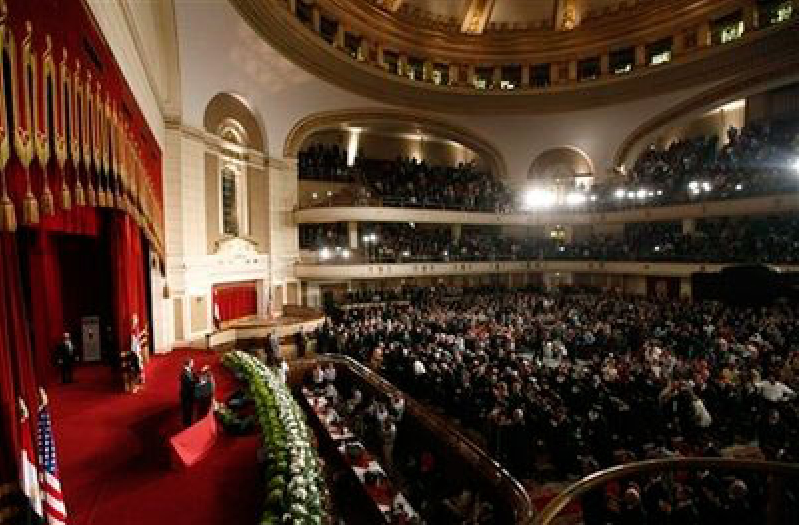
Although President Obama’s speech was generally hailed as successful in placing the U.S. and the Muslim world on better terms, some Christians and Muslims found fault with what he chose not to say.
For some Christian leaders, the speech was “brilliant” in terms making America more presentable to the Muslim world, but it failed to address the important issue of unequal treatment of religious minorities in Islamic countries compared to Western nations.
These critics took issue with Obama’s seeming to gloss over problems in Muslim countries, with some even saying the president seems more “pro-Islam” than “pro-Christian.”
“Obama’s speech seemed over and over again to say that we must give Muslims a better chance to be known in the West instead of allowing Christianity to be known in the Muslim countries,” complained Dr. William Wagner, professor or missions and evangelism at Olivet Theological College & Seminary in San Francisco.
Wagner pointed out that Obama noted the many mosques in America, but did not mention that it is forbidden to build Christian churches in Muslim countries. Obama also said it is important for Western nations not to restrict how Muslim citizens practice their faith, but did not note that the persecution of Christians in Muslim countries has resulted in near extinction of the community in some Muslim countries.
“What bothers me the most is not what he said but what he did not say,” said Wagner, the author of the book How Islam Plans to Change the World.
Similarly, Open Doors USA President Dr. Carl Moeller wished Obama had spoken more about the plight of Christians and other minorities in Muslim countries. Moeller said in countries where Islam is the official religion and sharia law is enforced, it is virtually impossible for Christians to practice their faith without persecution.
He also disagreed with Obama praising Saudi King Abdullah for his interfaith efforts, noting Saudi Arabia has the worst religious freedom in the world behind North Korea.
“Saudi Arabia calling on international religious tolerance is a little bit like the wolf calling for a sheep convention,” Moeller wrote in his column for The Christian Post.
Yet despite their criticisms, both Moeller and Wagner applauded Obama for striving to improve relations between the United States and the Muslim world.
Other Christian leaders and groups also praised the U.S. president for his historic speech.
The National Council of Churches and a large group of American Christian leaders, including Pastor Joel C. Hunter of Northland Church in Florida and the Rev. Mark S. Hanson, presiding bishop of the Evangelical Lutheran Church in America, commended Obama for addressing the people of the Middle East and challenging all sides to work towards peace in the Holy Land.
Among Muslims, many welcomed the U.S. president’s display of respect for Islam in his speech and his commitment to a two-state solution for the Israel-Palestinian conflict.
Dr. M. Zuhdi Jasser, president of the American Islamic Forum for Democracy (AIFD), however, had a different take on the speech. Instead of focusing on the president’s praise of Islamic culture, he said he was glad to hear Obama defend the United States against the “stereotype of a self-interested empire.”
But besides that slight approval, Jasser found many faults with the speech. He criticized Obama for giving “naive lip service” to Al Azhar University, the co-sponsor of the speech, which Jasser says has disseminated sharia laws that are “truly anathema” to the human rights ideas the U.S. president is trying to lift up in his speech.
He was also disappointed by Obama's failure to address the “global dangers” of political Islam driven by extremists groups such as the Muslim Brotherhood, of which many has received guidance from Al Azhar University.
“If he felt comfortable enough to cite the Koran, then he should have also felt comfortable and clear enough to cite the problems with Islamist ideologies,” said Jasser, who is a devout Muslim American. “The ideological theocratic threat will never go away until it is confronted head on.”
The former U.S. Navy Lieutenant Commander emphasized that Obama should have made stronger statements regarding the U.S. conflict with political Islam, which is a global security risk.
“To speak in Egypt and avoid the topic of political Islam, radical Islamism, and the Muslim Brotherhood was like visiting Moscow in the height of the Cold War and avoiding any mention of the inhumanities of communism and its incompatibility with liberty,” Jasser said.
At the end of his long, mostly critical opinion piece, Jasser applauded the president for “moving forward” and “rebooting” the relationship with Muslims around the world.
“But engagement done in vagaries with the core issues of ideological conflict entirely ignored will ultimately cause more harm than good,” the Muslim American warned.
He calls on President Obama to stand with Muslims around the world who want to challenge Muslim or Arab fascism and theocracy.







